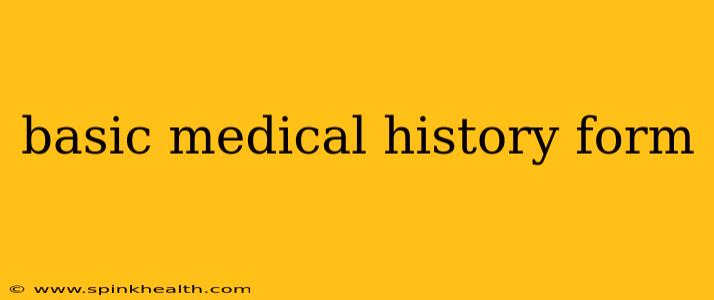Unlocking Health: A Comprehensive Guide to Basic Medical History Forms
Imagine stepping into a doctor's office for the first time. The friendly receptionist smiles, hands you a form, and says, "Please fill this out." That form? It's a basic medical history form, and it's the cornerstone of your healthcare journey. This isn't just a collection of questions; it's the story of your health, your family's health, and the key to unlocking personalized care. This guide will delve into the importance of these forms, what to expect, and how to ensure you provide accurate and complete information.
What Information Does a Basic Medical History Form Typically Include?
A standard medical history form acts as a detailed health snapshot, gathering information crucial for accurate diagnosis and treatment. It's a conversation starter between you and your healthcare provider, establishing a foundation for a long-term health partnership. Expect to encounter questions covering various aspects of your health, including:
- Demographic Information: This sets the stage, including your name, date of birth, address, contact information, and insurance details. It's the foundational layer of your medical record.
- Chief Complaint: This is the reason for your visit – the primary health concern that brought you to the doctor. Be specific! "Stomach ache" is vague; "sharp, stabbing pain in the upper abdomen after eating" is much more informative.
- Present Illness: This section dives deeper into your chief complaint. Your doctor will want to understand the onset, duration, and character of your symptoms, along with any aggravating or relieving factors. Think timeline and details.
- Past Medical History: This section explores your past health experiences. It includes previous illnesses, surgeries, hospitalizations, allergies (including reactions), and significant injuries. The more complete your answer, the better your doctor can understand your overall health profile.
- Family History: This is often overlooked but is incredibly significant. Your family's health history can indicate predispositions to certain diseases. Include information on parents, siblings, and grandparents, noting any instances of heart disease, cancer, diabetes, or other significant illnesses.
- Social History: This part encompasses your lifestyle factors. It includes details about your diet, exercise habits, smoking, alcohol consumption, drug use, occupation, and travel history. These aspects significantly influence your overall health.
- Medications: List all current medications, including prescription drugs, over-the-counter medications, vitamins, and herbal supplements. Note dosage and frequency.
- Allergies: Be precise about allergies, noting not just the allergen (e.g., penicillin) but also the type of reaction (e.g., rash, swelling, difficulty breathing).
Why is Accurate Information on a Medical History Form So Crucial?
Providing comprehensive and accurate information on your basic medical history form is paramount. Inaccurate or incomplete information can lead to misdiagnosis, ineffective treatment, and even harmful consequences. Your doctor relies on this information to make informed decisions about your care. Think of it as building blocks for a solid healthcare foundation.
What Happens if I Miss Information on the Form?
Don't worry if you miss some details on the form itself. Your doctor will likely ask clarifying questions during your appointment. It's always better to be forthcoming and raise any concerns you have, no matter how insignificant they may seem.
How Do I Fill Out a Basic Medical History Form Effectively?
Take your time! Don't rush. Read each question carefully and answer honestly and to the best of your ability. If you're unsure about something, leave it blank and address it with your doctor during the consultation.
What if I Have a Complex Medical History?
If you have a complex medical history, it's helpful to bring any relevant medical records or summaries to your appointment. This can expedite the process and ensure that your doctor has access to all the necessary information.
What is the Significance of Family History in a Basic Medical History Form?
Family history is a crucial component of your overall health profile. Genetic predispositions to certain diseases can run in families, making this information invaluable in assessing your risk factors and tailoring preventive care.
In conclusion, the basic medical history form is much more than just paperwork; it's the beginning of a collaborative journey towards better health. By completing it accurately and thoroughly, you empower your healthcare provider to provide the best possible care. It's an investment in your well-being and a crucial step towards a healthier future.

